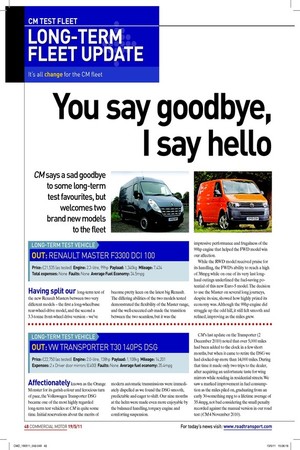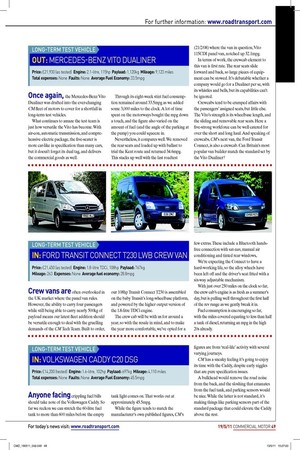You say goodbye, I say hello
Page 37

Page 38

If you've noticed an error in this article please click here to report it so we can fix it.
CM says a sad goodbye to some long-term test favourites, but welcomes two brand new models to the fleet OUT: RENAULT MASTER F3300 DCI 100 Price: £21,535 (as tested) Engine: 2.3-litre, 99hp Payload: 1,340kg Mileage: 7,434 Total expenses: None Faults: None Average Fuel Economy: 34.5mpg Having split our long-term test of the new Renault Masters between two very different models – the first a long-wheelbase rear-wheel-drive model, and the second a 3.3-tonne front-wheel drive version – we’ve become pretty keen on the latest big Renault. The differing abilities of the two models tested demonstrated the flexibility of the Master range, and the well-executed cab made the transition between the two seamless, but it was the impressive performance and frugalness of the 99hp engine that helped the FWD model win our affection.
While the RWD model received praise for its handling, the FWD’s ability to reach a high of 38mpg while on one of its very last longhaul outings underlined the fuel-saving potential of this new Euro-5 model. The decision to use the Master on several long journeys, despite its size, showed how highly prized its economy was. Although the 99hp engine did struggle up the odd hill, it still felt smooth and refined, improving as the miles grew.
OUT: VW TRANSPORTER T30 140PS DSG Price: £22,750 (as tested) Engine: 2.0-litre, 138hp Payload: 1,108kg Mileage: 14,201 Expenses: 2 x Driver door mirrors (£400) Faults: None Average fuel economy: 35.4mpg Affectionately known as the Orange Monster for its garish colour and ferocious turn of pace, the Volkswagen Transporter DSG became one of the most highly regarded long-term test vehicles at CM in quite some time. Initial reservations about the merits of modern automatic transmissions were immediately dispelled as we found the DSG smooth, predictable and eager to shift. Our nine months at the helm were made even more enjoyable by the balanced handling, torquey engine and comforting suspension. CM’s last update on the Transporter (2 December 2010) noted that over 5,000 miles had been added to the clock in a few short months, but when it came to retire the DSG we had clocked-up more than 14,000 miles. During that time it made only two trips to the dealer, after acquiring an unfortunate taste for wing mirrors while residing in residential streets. We saw a marked improvement in fuel consumption as the miles piled on, graduating from an early 30-something mpg to a lifetime average of 35.4mpg, not bad considering the small penalty recorded against the manual version in our road test (CM 4 November 2010). OUT: MERCEDES-BENZ VITO DUALINER Price: £21,930 (as tested) Engine: 2.1-litre, 115hp Payload: 1,120kg Mileage: 9,123 miles Total expenses: None Faults: None Average Fuel Economy: 33.5mpg Once again, the Mercedes-Benz Vito Dualiner was drafted into the ever-changing CM fleet of motors to cover for a shortfall in long-term test vehicles.
What continues to amaze the test team is just how versatile the Vito has become. With air-con, automatic transmission, and comprehensive electric package, the five-seater is more car-like in specification than many cars, but it doesn’t forget its dual tag, and delivers the commercial goods as well. Through its eight-week stint fuel consumption remained around 33.5mpg as we added some 3,000 miles to the clock. A lot of time spent on the motorways bought the mpg down a touch, and the figure also varied on the amount of fuel (and the angle of the parking at the pump) you could squeeze in.
Nevertheless, it compares well. We removed the rear seats and loaded up with ballast to trial the Kent route and returned 34.6mpg. This stacks up well with the last roadtest (21/2/08) where the van in question, Vito 115CDI panel van, notched up 32.1mpg.
In terms of work, the crewcab element to this van is first rate. The rear seats slide forward and back, so large pieces of equipment can be stowed. It’s debatable whether a company would go for a Dualiner per se, with its whistles and bells, but its capabilities can’t be ignored.
Crewcabs tend to be cramped affairs with the passengers’ assigned seats, but little else. The Vito’s strength is its wheelbase length, and the sliding and removable rear seats. Here a five-strong workforce can be well catered for over the short and long haul. And speaking of crewcabs, CM’s next van, the Ford Transit Connect, is also a crewcab. Can Britain’s most popular van builder match the standard set by the Vito Dualiner?
IN: FORD TRANSIT CONNECT T230 LWB CREW VAN Price: £21,450 (as tested) Engine: 1.8-litre TDCi, 108hp Payload: 767kg Mileage: 263 Expenses: None Average fuel economy: 28.8mpg Crew vans are often overlooked in the UK market where the panel van rules. However, the ability to carry four passengers while still being able to carry nearly 500kg of payload means our latest fleet addition should be versatile enough to deal with the gruelling demands of the CM Tech Team. Built to order, our 108hp Transit Connect T230 is assembled on the baby Transit’s long-wheelbase platform, and powered by the higher output version of the 1.8-litre TDCi engine.
The crew cab will be with us for around a year, so with the resale in mind, and to make the year more comfortable, we’ve opted for a few extras. These include a Bluetooth handsfree connection with sat-nav, manual air conditioning and tinted rear windows,.
We’re expecting the Connect to have a hard-working life, so the alloy wheels have been left off and the driver’s seat fitted with a six-way adjustable mechanism.
With just over 250 miles on the clock so far, the crew cab’s engine is as fresh as a summer’s day, but is pulling well throughout the first half of the rev range as we gently break it in.
Fuel consumption is encouraging so far, with the miles covered equating to less than half a tank of diesel, returning an mpg in the high 20s already.
IN: VOLKSWAGEN CADDY C20 DSG Anyone facing crippling fuel bills should take note of the Volkswagen Caddy. So far we reckon we can stretch the 60-litre fuel tank to more than 600 miles before the empty tank light comes on. That works out at approximately 45.5mpg.
While the figure tends to match the manufacturer’s own published figures, CM’s figures are from ‘real-life’ activity with several varying journeys.
CM has a sneaky feeling it’s going to enjoy its time with the Caddy, despite early niggles from the back, and the sloshing that emanates from the fuel tank, and parking sensors would be nice. While the latter is not standard, it’s making things like parking sensors part of the standard package that could elevate the Caddy above the rest.









































